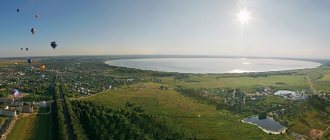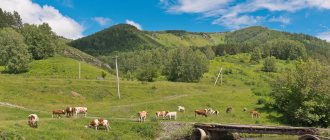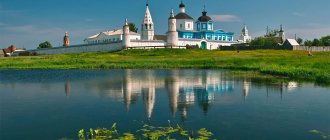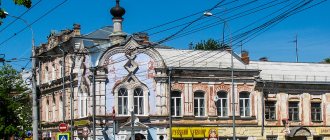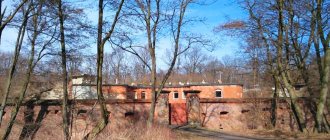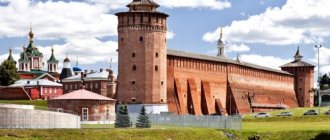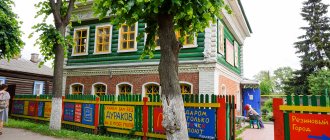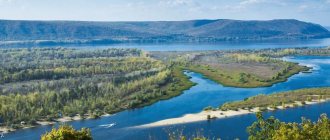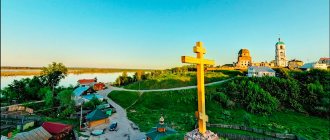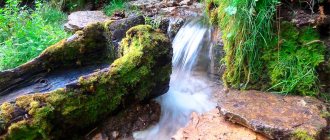The history of Pereslavl-Zalessky, founded by Yuri Dolgoruky in 1152 and one of the oldest city policies in the country, is replete with incredibly interesting events. Suffice it to say that according to the idea of the son and worthy successor of the work of Vladimir Monomakh, the city was to become - no more nor less - the capital of all north-eastern Rus'. Although the plans of the wise ruler were not destined to come true, ancient Pereyaslavl managed to leave a mark on the tablets of history. Here, in the swampy-plain Zalesye, the Grand Duke and Holy Land of Russia, Alexander Nevsky, was born. 150 years later, Dmitry Donskoy called a council of appanage princes, boyars, and governors to the city to determine a strategy for getting rid of the Tatar-Mongol yoke. In addition, the policy has grounds to claim the title of the cradle of the Russian Navy, because the first ships of the amusing flotilla of young Peter I plied the surface of Lake Pleshcheyevo. A reminder to descendants of the significant events of the past of the great country are the sights of Pereslavl-Zalessky, photos and descriptions of which are presented below. Hundreds of thousands of tourists annually visit the city, included in the Golden Ring of Russia, to see the unique historical monuments with their own eyes.
Attractions in the vicinity of Pereslavl-Zalessky
Museum-estate "Boat of Peter I"
Museum-estate "Boat of Peter I"
The year the museum was founded can be considered 1803, when the “Boat House” was built. It is known that at the end of the 17th century, Peter 1 created a “funny” fleet in the vicinity of Pereslavl-Zalessky. Shipyards worked near the city, and finished ships sailed along Lake Pleshcheevo. The oak boat "Fortune" is the only one preserved from that first flotilla.
In addition to viewing the boat, tourists will be interested in the exhibition at the White Palace. There you can learn in detail the history of the estate, see shipbuilding tools, go to the “Office of Peter 1” and the main hall.
Address: Botik town, Pereslavl district, Yaroslavl region.
Opening hours: daily from 10:00 to 17:00; Monday is a day off. Entrance to the territory - 50 rubles.
Official website: https://museumpereslavl.ru/ru/branch/museum_botik/
Teapot Museum
Teapot Museum
The founder of the teapot museum is the same as that of the iron museum. The exhibition is located in a small peasant house on the outskirts of the city. Here you can find teapots of all sizes, samovars, as well as cup holders and sugar tongs. Plus all sorts of little things related to tea drinking (tea packaging, candy boxes).
The ticket price includes a guided tour that briefly explains the history of the tea party. The museum is small, it takes 30 minutes to explore.
Address: Podgornaya street, 94, Veskovo village, Yaroslavl region.
Opening hours: from May to September daily from 10:00 to 18:00; from October to April on weekends and holidays from 10:00 to 18:00
Entrance: for adults - 160 rubles, for children - 60 rubles, children under 7 years old - free
Nikitsky Monastery
Nikitsky Monastery
The oldest Russian monastery, dating back to the 12th century. It can be seen at the exit from the city, in Nikitsky Sloboda. Under Ivan the Terrible, the monastery was surrounded by walls with towers and loopholes, and the stone Nikitinsky Cathedral was built on its territory.
At the beginning of the 20th century, the monastery was closed, its buildings were deteriorating, and by 1984 the Nikitsky Cathedral began to collapse. In 1993, the monastery reopened its doors, and today it is undergoing large-scale restoration.
The Nikitsky Cathedral of the 16th century, the Church of the Annunciation with a refectory chamber and a hipped bell tower of the 16th–17th centuries, and the gate bell tower of the 19th century deserve attention.
Address: Zaprudnaya street, 20, Nikitskaya Sloboda, Yaroslavl region.
Opening hours: daily from 7:30 to 16:00
Alexandrova mountain
Alexandrova mountain
A 30-meter hill rises on the shore of Lake Pleshcheevo. According to legend, this is a man-made structure. Its creation is attributed to Alexander Nevsky himself. He founded a monastery on the mountain (it has not survived to this day). It is known that a sacred place (“temple”) of pagan tribes was located here.
Today, Alexandrova Mountain is a wonderful viewing platform, from where a wonderful panorama of Lake Pleshcheevo and its surroundings opens.
Address: Alexandrova Gora, Lake Pleshcheyevo National Park, Yaroslavl region
Lake Pleshcheyevo National Park
Lake Pleshcheyevo National Park
The park received national status in 1998, and was organized ten years earlier, in 1988. The park includes Lake Pleshcheyevo and its surroundings, the dendrological garden named after S.F. Kharitonov, Alexander Mountain, Sin-kamen, ecological trails.
The main object, without a doubt, is the lake - one of the most picturesque lakes in Russia. Here you can admire the natural landscapes, relax on the beach, ride a boat, kitesurf, or live in a tent. In short, a paradise for lovers of outdoor recreation.
Address: Sovetskaya street, 41, Pereslavl-Zalessky, Yaroslavl region
Official website: https://plesheevo-lake.ru/
Blue stone
Blue stone
A couple of kilometers from the city, on the shore of Lake Pleshcheevo, you can see a real pagan shrine - the Sin-stone. Initially it was located on Aleksandrovskaya Mountain. In the Middle Ages, Orthodox Christians came to the stone with requests for healing. The Orthodox clergy fought against the worship of the pagan stone, but without much success.
Modern tourists visit the Blue Stone as a tourist attraction, but some still believe in “magical” healing. Some money is left at the stone, and colored ribbons are tied to the bridges near the lake.
Address: Kriushkino village, Yaroslavl region
Entrance: for adults - 200 rubles.
St. Barbara's Spring
St. Barbara's Spring
15 km from the city, near the village of Kupan, there is a source of the Great Martyr Barbara. People have been coming to him for 200 years. The spring is believed to have healing powers, especially good for eye diseases. Perhaps the fact is that spring water contains silver ions.
There is a chapel near the source. People come here to get water and take a dip in a specially equipped bathhouse.
Address: Kupan village, Yaroslavl region
Railway Museum
Railway Museum
The railway museum is located 25 km from Pereslavl-Zalessky. It recently celebrated its 30th anniversary (opened in 1991). The collection includes not ordinary steam locomotives, but “cuckoo” narrow-gauge trains.
Those who dreamed of becoming a machinist as a child will be delighted. Visitors are invited to examine locomotives of the 19th and early 20th centuries and railway equipment. For a fee, you can ride a handcar.
Address: Leshoznaya street, 1, Talitsy village, Yaroslavl region
Opening hours: daily from 10:00 to 18:00; Monday, Tuesday - closed
Entrance: for adults - 200 rubles, for children - 100 rubles, children under 7 years old - free
Official website: https://kukushka.ru/info/tarif.html
Museum "Birth of a Fairy Tale"
Museum "Birth of a Fairy Tale"
Interactive exhibition telling about Russian folklore and Slavic mythology. The exhibits tell about the prototypes of fairy-tale heroes, the connection between mythology and fairy tales. It is better to come here with a tour (there are for adults and for children). Children willingly participate in interactive programs and wander through the fairy-tale maze.
Address: Moskovskaya street, 1, Vasilevo village, Yaroslavl region
Opening hours: daily from 10:00 to 16:00
Entrance: for adults - 300 rubles, for children - 200 rubles, children under 3 years old - free
Official website: https://www.muzeiskazki.ru/
Museum of Gramophones and Records
Museum of Gramophones and Records
The museum is part of the Botik complex in the village of Veskovo. The collection (collected by Sergei Palekhov) includes gramophones, gramophones, and music boxes from the first half of the 20th century.
An interesting place for lovers of tube music. If you go to the museum on a 30-minute excursion, you can hear the sound of various gramophones.
Address: street. Petra 1, 59B, Veskovo village, Yaroslavl region
Opening hours: daily from 10:00 to 18:00; Monday - closed
Entrance: for adults - 150 rubles.
Official website: https://tkbotik.ru/muzey-grammofonov/
Teapot House Museum
The same enthusiast Andrei Vorobyov founded the Teapot House museum in the suburbs of Pereslavl-Zalessky. The brightly painted rustic wooden house, surrounded by apple trees and humorous signs, houses more than 150 teapots and samovars from all over Russia.
Teapot House Museum
The excursion will take place to the sounds of a gramophone, after which you can drink tea with buns and buy a souvenir in the shop.
- Address: Veskovo village, st. Peter the Great, no. 17.
- Opening hours: Wednesday-Sunday - from 10:00 to 18:00.
- Cost of visiting: adult ticket - 160 rubles, schoolchildren - 60 rubles, preschoolers - free.
Where to go in Pereslavl-Zalessky and what else to see
Goritsky Monastery
Goritsky Monastery
The monastery already existed in the 14th century; it is impossible to say more precisely - the archives burned down in the 18th century. The monastery is located on a small hill (“goritsa”), so its buildings seem to fly above the city.
The buildings that have survived to this day date back to the 17th and 18th centuries. Development was especially active after 1744, when the monastery was turned into the residence of the archbishop of the diocese. After the abolition of the diocese in 1788, the monastery was practically abandoned. Only in 1919 a local history museum was located there.
The buildings of the Assumption Cathedral (especially its interior) from the 18th century deserve special attention. The 17th century Passage Gate, built in the Moscow Baroque style, is very interesting. And, of course, a very popular observation deck is the bell tower of the Church of the Epiphany.
Address: Museum lane, 4, Pereslavl-Zalessky, Yaroslavl region.
Opening hours: daily from 10:00 to 18:00; Monday - closed
Entrance to the territory - 50 rubles.
Official website: https://museumpereslavl.ru/
"Berendey's House"
"Berendey's House"
The exhibition and entertainment complex opened its doors in 2005. The wooden house with a carved porch houses a museum of masks, the tower of the fairy-tale Tsar Berendey, a center for the preservation of crafts, a souvenir shop and a cafe.
You can only get inside with an interactive program. A suitable place to relax with children. The little ones like to hear about Tsar Berendey, sit on his throne, and meet Baba Yaga. Older children are fascinated by master classes in painting toys and assembling beads.
Address: st. Uritskogo, 38, Pereslavl-Zalessky, Yaroslavl region.
Opening hours: daily from 10:00 to 17:00
Entrance: for adults - 300 rubles, children under 4 years old - free
Official website: https://www.dom-berendej.ru/
Museum of Peasant Design “Horse in a Coat”
Museum of Peasant Design “Horse in a Coat”
A young private museum (opened in May 2021) with an original concept. Its creators are going to “rehabilitate the Russian village.” The exhibition hall displays items from peasant life - spinning wheels, sundresses, tiles, embroidery, and forging samples. Those interested can take a master class in belt weaving and fabric printing.
Address: Konnaya st., 17, Pereslavl-Zalessky, Yaroslavl region.
Opening hours: daily from 10:00 to 18:00
Entrance: for adults - 200 rubles, for children - 100 rubles.
Official website: https://www.horsencoat.com/
Iron Museum
Iron Museum
The private museum has been operating since 2002. It is located in a restored merchant mansion on the 2nd floor. The exhibition includes not only irons (more than 200 different models), but also rolling pins and rubles, as original “prototypes” of the iron.
On the 1st floor there is an antique souvenir shop that sells items common to tourist cities: magnets, toys, ceramic plates.
Address: Sovetskaya st., 11, Pereslavl-Zalessky, Yaroslavl region.
Opening hours: from May to September daily from 10:00 to 18:00; from October to April on weekends and holidays from 10:00 to 18:00
Entrance: for adults - 200 rubles, for children - 100 rubles, children under 7 children - free
Museum of the History of Money
Museum of the History of Money
Organized in 2010. The museum's exposition began with a collection of coins from the amateur numismatist Altunin.
Here are coins and paper tickets from different eras. The oldest is a Greek coin from the 6th century BC. There are coins from Rome, the Ottoman Empire, Western Europe and, of course, the Russian Empire and the USSR.
Address: st. Petra 1, 2B, Pereslavl-Zalessky, Yaroslavl region.
Opening hours: daily from 10:00 to 18:00; - day off
Entrance: for adults - 150 rubles, for children - 100 rubles.
Official website: https://museum-deneg.rf/
Radio Museum
Radio Museum
A private museum created by collector Semenov in 2013. The exhibitions are located in a spacious two-story building.
Here you can see tube radios from the 30s-60s and televisions from the 50s-60s, film cameras and movie cameras. As well as a unique exhibition dedicated to the naval space fleet.
Address: Podgornaya street, 40, Pereslavl-Zalessky, Yaroslavl region.
Opening hours: daily from 10:00 to 18:00; Monday, Tuesday - closed
Entrance: for adults - 200 rubles, for children - 100 rubles.
Official website: https://museum-radio.rf/
Museum of Cunning and Ingenuity
Museum of Cunning and Ingenuity
There is a fun museum in the city center (since 2011). The exhibition is based on objects created with an exceptionally creative approach. Here you can see teapots with three spouts, cups for mustachioed men, antique bottle openers, nut crackers, and cherry pitters. The ticket price includes a tour.
In the next room there is an antique shop where tourists buy old clothes and souvenirs.
Address: Sovetskaya street, 14, Pereslavl-Zalessky, Yaroslavl region
Opening hours: daily from 10:00 to 17:00; Monday - closed
Entrance: for adults - 150 rubles, for children - 50 rubles.
Temple of the Forty Martyrs of Sebaste
Temple of the Forty Martyrs of Sebaste
Located near the mouth of the Trubezh River. This place was once called Rybnaya Sloboda. The ornate and graceful church was built in the 18th century.
The temple is notable for its location - from the side of the lake it seems to float above the water. In addition, it is considered a beacon for fishermen. The church is bright - scarlet walls, contrasting white trim. For fishermen who have sailed far to the lake, the temple serves as an excellent landmark.
Address: Left Naberezhnaya street, 165, Pereslavl-Zalessky, Yaroslavl region
Opening hours: daily from 7:00 to 20:00
Official website: https://40s.pereslavl.ru/40/
Feodorovsky Convent
Feodorovsky Convent
Monastery in the southern part of the city. It has existed since the 13th century. But only stone buildings from the 16th–18th centuries have reached us - this is the Fedorov Cathedral of the mid-16th century, the Church of the Entry (17th century), the Temple of the Kazan Icon of the Mother of God (second half of the 18th century).
This place has a complex history: in the 16th and 17th centuries, women who fell into disgrace, for example, “unnecessary” wives, were exiled here. Russian patterned weaving began here.
Under Soviet rule, the monastery was closed. The buildings were either empty or used as a children's colony or a nursing home. The monastery was reopened in 2006.
Address: Moskovskaya street, 85, Pereslavl-Zalessky, Yaroslavl region
Official website: https://feodor-monastyr.ru/ru/
Arboretum of S. F. Kharitonov
Arboretum of S. F. Kharitonov
The Soviet forester Kharitonov built an arboretum with unique types of vegetation in the 70s of the 20th century. Now it is a huge forest park, divided into zones (Crimea, Japan, Caucasus). It is interesting to walk here not only for adults, but also for children. The “Path of Fairy Tales” route has been organized especially for children.
Address: Zhuravleva street, 1B, Pereslavl-Zalessky, Yaroslavl region
Opening hours: daily from 10:00 to 18:00
Official website: https://www.plesheevo-lake.ru/dendrologicheskiy-sad//
Kardovsky Estate
Kardovsky Estate
In the southern part of the city there is a wooden house of the Kardovskys. The mansion was built at the end of the 19th century in the false Russian style. In the first half of the 20th century, the famous artist Kardovsky, a native of Pereslavl, lived here.
Now the house is a creative arts center. Here you can rent a room or take a walk in the garden, and also admire the sculptures and paintings inside the building.
Address: Moskovskaya street, 30a, Pereslavl-Zalessky, Yaroslavl region
Simeon Church
The Simeon Church, as a striking example of provincial baroque, attracts the attention of both parishioners and travelers.
Simeon Church
Its construction began at the end of the 16th century: something was added, something was destroyed. The characteristic white and red color of the walls and the fancy roof with five domes remained unchanged. The Soviet authorities did not dare to completely destroy the temple; it housed warehouses and a store. The reconstruction of the stone building began in 1992 and has not yet been completed.
Interesting fact! The church consists of two floors and two altars (the upper one is in honor of Simeon the Stylite, the lower one is in honor of Alexy, the man of God). There is an icon of Spyridon of Trimifuntsky and an icon of the Kazan Mother of God.
- Address: st. Rostovskaya, 16.
- Opening hours: daily - 08:00-16:00, on days of services - 07:30-20:00.
- Entry cost: free.
Sights of Pereslavl-Zalessky in one day
Pereslavl-Zalessky Museum-Reserve
Pereslavl-Zalessky Museum-Reserve
The museum-reserve was created in 1918. The main exhibitions are located in the former Goritsky nunnery. The museum's collections are varied: wooden sculpture of the 16th–19th centuries, items (from family portraits to grandfather clocks) from noble estates, household items of peasants.
The pride of the museum is its collection of decorative and applied arts. Here you can see embroideries and fabrics, items made of gold and silver related to the Orthodox cult (crosses, censers, chalices).
The reserve includes a number of branches - the Peter the Boat 1 Museum, the Transfiguration Cathedral, an exhibition hall on Rostovskaya Street and the Ganshin Estate Museum.
Address: Museum Lane, 4, Pereslavl-Zalessky, Yaroslavl region
Opening hours: daily from 10:00 to 18:00; Monday - closed
Entrance to the territory - 50 rubles, single ticket for adults - 350 rubles, for children - 150 rubles.
Official website: https://museumpereslavl.ru/ru/index.html
Nikolsky Monastery
Nikolsky Monastery
Dmitry Prilutsky founded the monastery in the 14th century. Literally a couple of decades later, the monastery (then male) was plundered during the invasion of Khan Tokhtamysh. Almost the entire history of the monastery consists of a century or two of prosperity, followed by ruin. The last time the monastery was closed was in 1923, and in 1994 it was revived.
In the monastery, it is worth paying attention to the Church of the Annunciation and the gate church. Both buildings were erected in the mid-18th century in the Baroque style.
Address: st. Gagarina, 43, Pereslavl-Zalessky, Yaroslavl region
Opening hours: daily from 6:30 to 17:00
Official website: https://nikolskii.jimdo.com/
Kremlin of Pereslavl-Zalessky
Kremlin of Pereslavl-Zalessky
The oldest building in the city. Actually, the age of Pereslavl dates back to the construction of the Kremlin in the 12th century. The earthen ramparts and the Transfiguration Cathedral have survived to this day.
Also on the territory of the Kremlin there are later buildings - the Vladimir Cathedral and the Church of Alexander Nevsky were erected in the 18th century. The time of construction of the Church of Peter the Metropolitan is the 16th century.
Address: within the Gross Ring, Sovetskaya, Sadovaya, Proezdnaya and Red Square streets
Fortress ramparts of Pereslavl
Fortress ramparts of Pereslavl
Created in the 12th century, the Kremlin was surrounded by earthen ramparts up to 16 meters high (now only 11 meters). Their total length is 2.5 km. Oddly enough, the ramparts have survived to this day in good condition. Internal wooden reinforcements give them stability.
The ramparts are popular as an observation deck - from them you can clearly see the historical part of the city.
Address: Valovoe Koltso street, Pereslavl-Zalessky, Yaroslavl region
Alexander Nevsky Museum
Alexander Nevsky Museum
It was opened to visitors in 2012. Oddly enough, this is the first museum in Russia dedicated to the prince. At the exhibition you can see a model of Pereslavl of the 13th century, mannequins of 4 warriors of that era - a Russian prince (apparently Nevsky himself), a Russian man-at-arms, a Teutonic knight and a Horde archer.
Another exhibition consists of icons depicting Alexander Nevsky. And finally, a collection of medals and orders named after Nevsky.
Address: Museum lane, 9, Pereslavl-Zalessky, Yaroslavl region.
Opening hours: daily from 10:00 to 17:00; Monday - closed
Entrance: for adults - 200 rubles, for children - 120 rubles, children under 5 years old - free
Official website: https://www.muzeinevskogo.ru/
Russian Park
Russian Park
This theme park is dedicated to Russian culture and life of the 19th-20th centuries. In a small space in the city center, various museums are collected (puppet theater, Russian inventions, kvass and tea). There are open-air exhibitions - the Alley of Russian painting, Russian platbands.
There is also a petting zoo, a tavern with Russian cuisine, a children's playground, and a souvenir shop.
Address: Moskovskaya street, 158, Pereslavl-Zalessky, Yaroslavl region
Opening hours: daily from 10:00 to 19:00
Entrance: for adults - 300 rubles, for children - 150 rubles.
Official website: https://ruparkru.com/
Znamenskaya Church
As if from a picture - this is the first thought that comes to your mind when you see the Temple of the Sign of the Blessed Virgin Mary. The facade of the Znamenskaya Church is snow-white and with an abundance of faces of saints painted in color.
Znamenskaya Church
The church looks so bright and unusual today. Initially, its construction was associated with the name of the wife of Dmitry Donskoy (Princess Evdokia), who miraculously escaped during the invasion of Khan Tokhtamysh at the end of the 14th century. The wooden temple was rebuilt from stone in 1788 at the expense of Anna Ivanovna Maslova, the widow of a local major. Provincial baroque was reflected in the Znamenskaya Church. Later, a school was opened in one of the parishes to teach local children to read and write. In Soviet times, the temple building was completely demolished, and a new one was rebuilt in the late 2000s.
Interesting fact! The temple has chapels bearing the names of iconic persons: the chapel of John the Baptist, the chapel of Princess Evdokia Donskaya, the chapel of the Russian Emperor Nicholas II.
- Address: st. Trubezhnaya, 7 A.
- Opening hours: Saturday-Sunday - 08:00–14:00.
- Entry cost: free.
FAQ
What attractions near Pereslavl-Zalessky can you visit by car? Museum-Estate "Boat of Peter I", Museum of the Teapot, Nikitsky Monastery, Alexandrov Mountain, Pleshcheyevo Lake National Park, Blue Stone, St. Barbara's Source, Railway Museum, Museum "Birth of a Fairy Tale", Museum of Gramophones and Records.
can you go with children in Pereslavl-Zalessk “Berendey’s House”, Iron Museum, Museum of Cunning and Ingenuity, Arboretum of S. F. Kharitonov, Russian Park, Alexander Nevsky Museum.
Top attractions of Pereslavl-Zalessky Cathedral of the Vladimir Icon of the Mother of God of the Presentation, Goritsky Monastery, “Berendey's House”, Pereslavl-Zalessky Museum-Reserve, St. Nicholas Monastery, Pereslavl-Zalessky Kremlin.
Dendrological Garden named after. Kharitonov
Since 1952, a dendrological garden began to operate in the city, founded by forester S. F. Kharitonov.
Dendrological Garden named after. Kharitonov
More than 600 species of shrubs and trees grow in the garden, some of which are not entirely suitable for this climatic zone. Many cascades and gazebos, sculptures and figurines of fairy-tale characters can be seen while walking through the garden. There is a children's playground.
- Address: st. Zhuravleva, 1 B.
- Opening hours: from May to October - from 10:00 to 20:00.
- Cost of visiting: adult ticket - 100 rubles, discounted ticket - 50 rubles.
Best hotels of Pereslavl-Zalessky
Related materials:
- 31 attractions of Novorossiysk to visit
- 33 attractions of Bakhchisaray that are worth visiting
- 31 attractions of Ryazan that are worth seeing
- 28 best attractions in Belgorod,…
- 43 best attractions in Minsk,…
- 32 best attractions in Perm that are worth seeing
- 42 best must-see attractions in Rome
- 23 attractions of Petrozavodsk that…
- 25 sights of Olenevka that are worth seeing
Did you like the article? Share with friends:
1
Let's sum it up
Pereslavl-Zalessky is a small pearl on the string of cities of the Golden Ring of Russia. It is located not far from Moscow (only 140 km), so you can get there by private car and take a sightseeing tour in one day. But if you plan to visit all Orthodox churches (6 active monasteries and 9 churches), you will have to stay for a long time.
The city has many museums opened by private individuals. There are no such interesting exhibitions anywhere else; you won’t be able to see them in Tambov or other parts of the country. When you come to museums, you can always count on not only excursion support, but also an interactive experience: sewing an apron, heating a samovar, ironing a tablecloth with a charcoal iron, or riding a trolley. In general, you definitely won’t be bored in Pereslavl-Zalessky. For lovers of the southern regions of Russia, we recommend seeing the sights of Crimea.
Cathedral of the Great Martyr Nikita.
The main cathedral of the Great Martyr Nikita (1561-1564) was built in the center of the monastery territory at the behest of Ivan the Terrible. Its southern aisle is a temple built by Vasily III in 1520, in fact, the first stone building of the monastery. Its top was built on during the construction of a new large cathedral. In subsequent centuries, the cathedral underwent numerous reconstructions. The middle dome is unusually large, so that next to it, the side domes that are far from being small seem quite small. At the end of the 1980s. The central dome unexpectedly collapsed and has now been restored.
Goritsky Assumption Monastery.
The passage gate of the monastery in the eastern wall is considered a true masterpiece of architecture of the 17th century. They are not tall and served more of a household function, but their elegant decoration certainly attracts attention and makes them stand out against the backdrop of almost smooth, decor-free walls. The walls were completed in the 18th century. At that time, the new wall no longer had any defensive significance, so its height was much less than is usually the case in ancient fortresses. In the 19th century, a low belfry was built in the northern wall, from which a magnificent view of Lake Pleshcheyevo opens.
Tent bell tower.
The tented bell tower (1668), adjacent to the refectory, is located between the Nikitsky Cathedral and the Church of the Annunciation. The pillar is octagonal, decorated with horizontal belts. The area for bells and ringing, covered with a tent containing “rumours”, is surrounded by wide arched openings.
The second, newer bell tower - the gate tower, in three tiers, was built in the first decades of the 19th century. The temple of the Archangel Gabriel was built in it. The bell tower is much higher than the old one and is consistent with the traditions of its time, which makes it sharply different from the rest of the ensemble, with the exception of the completion of the towers, erected on the site of the previous tents in the same 19th century.
St. Vladimir's Cathedral.
The Vladimir Cathedral (1740s) was built in the Bogoroditsko-Sretensky nunnery at the expense of the merchant Philip Fadeevich Ugryumov. After the abolition of this monastery in 1764, the church became a parish. At the beginning of the twentieth century, the spacious and rebuilt Vladimir Cathedral was turned into the main city church, and therefore received the nickname New among the townspeople (in contrast to the Old - this was the name of the ancient Transfiguration Cathedral). The appearance of the Vladimir Cathedral is quite unusual - a tall building with very closely spaced domes on high drums, one triangular apse with two tiers of windows, a narrow and high dome under the central drum. The latter is very large compared to the side ones, which also gives the appearance of the temple originality.
In 1933, the cathedral bell tower, which was a round tower, was demolished along with the stone fence surrounding the temple. It stood between the Vladimir and Alexander Nevsky churches, approximately at the place where the expanded Yaroslavl highway now passes. After 1929, the Vladimir Cathedral was given over to the city House of Sports, later converted into a bakery, and a bread store was opened in the altar. Nowadays, the cathedral has been almost completely restored and is functioning again. (Address: Sovetskaya st., 12)
